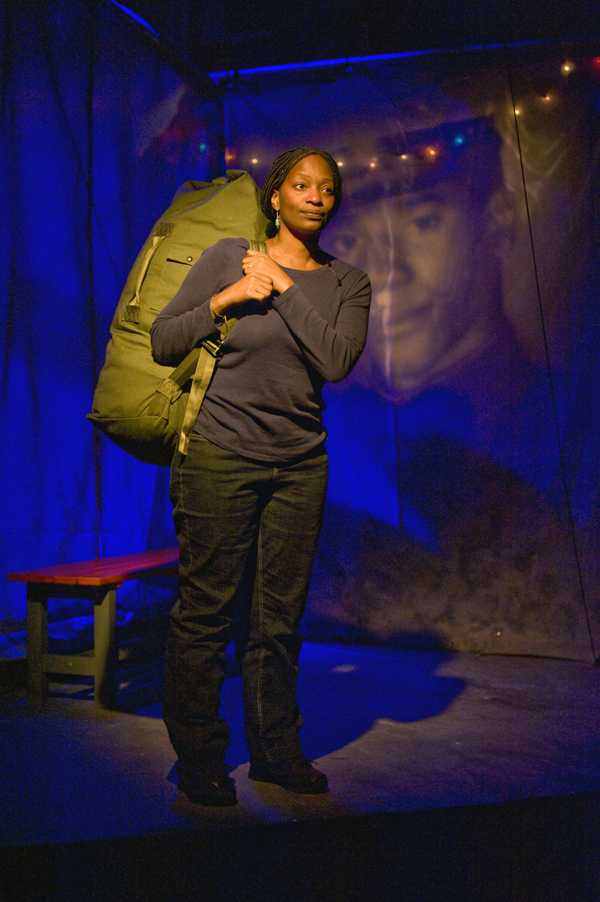Sometimes it pays to read the play’s description before entering the theater. Contrary to what “Welcome Home, Jenny Sutter” suggests, Jenny Sutter refuses to go home at all.
In the stunning opening, Sutter, played by Lily Mojekwu, lies on a bed and via voiceover we learn of her parents’ troubled marriage and her desire to follow in her grandfather’s footsteps who, like her, was a Marine. The lighting casts an ethereal glow, with flashlights shining through the white tarp serving as the background. In a moment that best highlights Mojekwu’s ability to add serious gravity to her role, Sutter sits up and begins to change her clothes. As she struggles to pull off her right pant leg, the audience realizes she has a prosthetic limb.
Playwright Julie Marie Myatt makes Sutter’s prosthetic leg the focus of the work. It is the source of Sutter’s doubt concerning her beauty and attractiveness to men; she even fears her children will not be able to relate to her or accept her because of the prosthetic.
During the play, Sutter meets Lou, a woman who has been addicted to just about everything, from drugs to petty theft, at a dirty train station. Lou, played by Jenny Avery, offers Sutter a place to crash. Enter Slab City, an old Marine base where a group of hippies live in tents and befriend everyone in the community.
Rick and Jackie Penrod’s scenic design makes wonderful use of Next Theatre’s difficult space, which has no wings. The tarp, which previously served as the train station’s walls, is lifted to the ceiling to reveal the colorful collection of stuff that is Slab City. Red and orange lanterns light the space, and photos, clothes and an electric fan hang from various beams.
For a large portion of the production, Sutter and the plot seem to meander. Save for Lou, who Avery plays with an excellent combination of humor and vulnerability that conveys the character’s complexity, the other characters’ stories were not memorable. Buddy’s sermons are long and uninspiring, and although Donald does provide a few laughs, his romantic connection to Sutter feels contrived and out of place. For much of the play Sutter is cast into the shadows, thanks in part to Mojekwu’s acting, which makes the character stiff and withdrawn. It is for this reason that Sutter’s request for booze and a kiss from various Slab City male residents is so out of character.
The production heads in the right direction, or at least the one I was expecting, when a welcome-home celebration is thrown for Sutter. She ducks for cover, confusing a balloon popping with a bomb explosion, signified by a shocking red light. Later on, I was able to connect the pieces of her story when Sutter admits that she is unsure of what she’s doing and where her life is headed. Audiences are finally able to see her acknowledge her traumatic experience during her tours in Iraq and Afghanistan.
“Welcome Home, Jenny Sutter” attempts to address how we treat veterans upon their return from combat. However, the play gets bogged down by the minor characters’ personal stories, failing to help the audience emotionally invest in the plights of either Sutter or Slab City’s residents.
“Welcome Home, Jenny Sutter” is directed by Jessica Thebus, a Northwestern alumna and MFA Directing faculty member. It is running through Dec. 23 at Next Theatre in Evanston.

